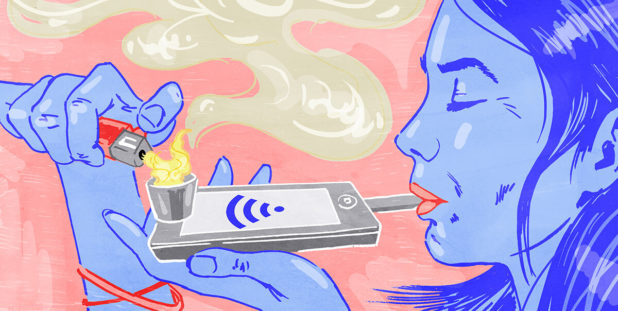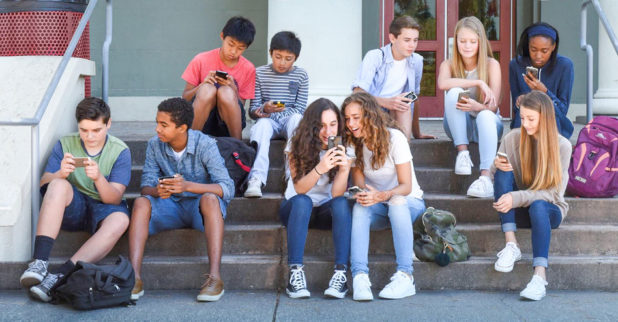There are several things that you’re really just not allowed to talk about under any circumstances.
The most obvious historically has been the historicity of homicidal gas chambers in Nazi prison camps. The newest off-limits topics are the obvious fraud which took place in the 2020 election and the clear health dangers of the coronavirus vaccine.
Another one of those topics is the health dangers of birth control pills. Another is the health dangers of so-called “anal sex.”
You cannot do studies on any of these things, and you cannot even collect information on them informally.
Fake shower room gas chambers, the 2020 election, the corona vaxx, the pill and anal are all black boxes.
The health dangers of cellphones – the worst of which are psychological – are not quite as off-limits as the pill or anal-ramming, but they’re close.
Occasionally, a study gets through.
It never looks good.
Smartphone users have become “human snails carrying our homes in our pockets”, with a tendency to ignore friends and family in favour of their device, according to a landmark study.
A team of anthropologists from UCL spent more than a year documenting smartphone use in nine countries around the world, from Ireland to Cameroon, and found that far from being trivial toys, people felt the same way about their devices as they did about their homes.
“The smartphone is no longer just a device that we use, it’s become the place where we live,” said Prof Daniel Miller, who led the study. “The flip side of that for human relationships is that at any point, whether over a meal, a meeting or other shared activity, a person we’re with can just disappear, having ‘gone home’ to their smartphone.”
This phenomenon was leading to the “death of proximity” when it comes to face-to-face interaction, he said.
“This behaviour, and the frustration, disappointment or even offence it can cause, is what we’re calling the ‘death of proximity’. We are learning to live with the jeopardy that even when we are physically together, we can be socially, emotionally or professionally alone.”
This site was launched just right about the time that this phone phenomenon began in earnest, and Andrew Anglin has continually pressed the issue, and told people: you don’t have to participate.
Yes, you probably have to have a cellphone. And yes, it probably has to be a smartphone. That is, for most people, not avoidable.
However, you can and should establish clear boundaries with this device.
For example: when you meet with a friend or family member, you can simply turn it off. Sometimes, you may be able to just not bring it to a meeting.
It is a good idea to own a computer. You can make the computer your primary device for reading and electronic communication. Most of the major messaging apps have desktop versions that you can install. This will cause you to associate your electronic behaviors with a device that is not always in your pocket.
Something that we have yet to see a study on, but which is anecdotally true, is that if you do not bring out your phone while meeting with someone, that other person is much less likely to bring out their phone. If they do bring out their phone, and you do not immediately respond by also bringing out your phone, the person will likely say “I’m sorry, I just have to do something really quick” and then put the phone down.
What has been observed is that people expect that if they pull out their phone, whoever they are with will do the same, and people seem to be aware when they pull out the phone and the people they are with do not do the same. If you simply sit there, the other person will recognize what is happening.
It might not seem like it matters at this point, but limiting cellphone involvement is good for everyone’s mental health. The likelihood is that you are personally addicted to the device yourself, and you will have some trouble getting off of it. But like with alcohol, drugs, or sugar, the less you use it, the less it calls to you.



